外研版(2019)选择性必修 第一册Unit 6 Nurturing nature Using language课件(共17张PPT)
文档属性
| 名称 | 外研版(2019)选择性必修 第一册Unit 6 Nurturing nature Using language课件(共17张PPT) | 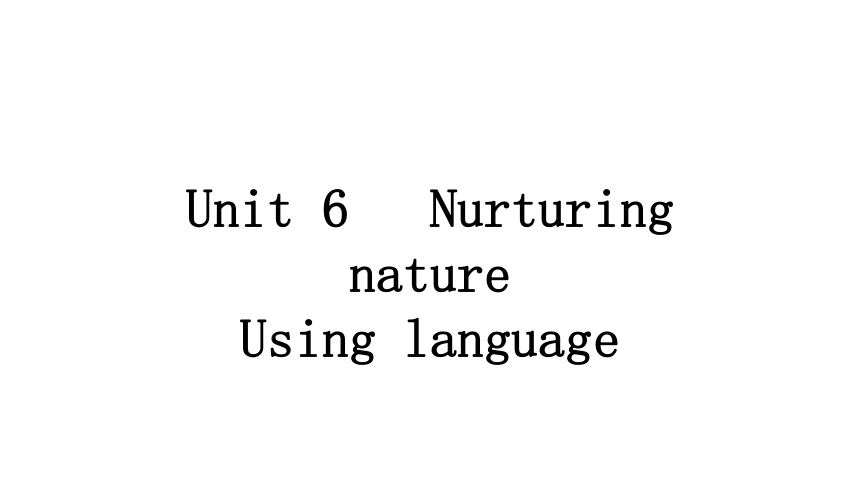 | |
| 格式 | pptx | ||
| 文件大小 | 19.7MB | ||
| 资源类型 | 教案 | ||
| 版本资源 | 外研版(2019) | ||
| 科目 | 英语 | ||
| 更新时间 | 2023-10-26 16:16:39 | ||
图片预览

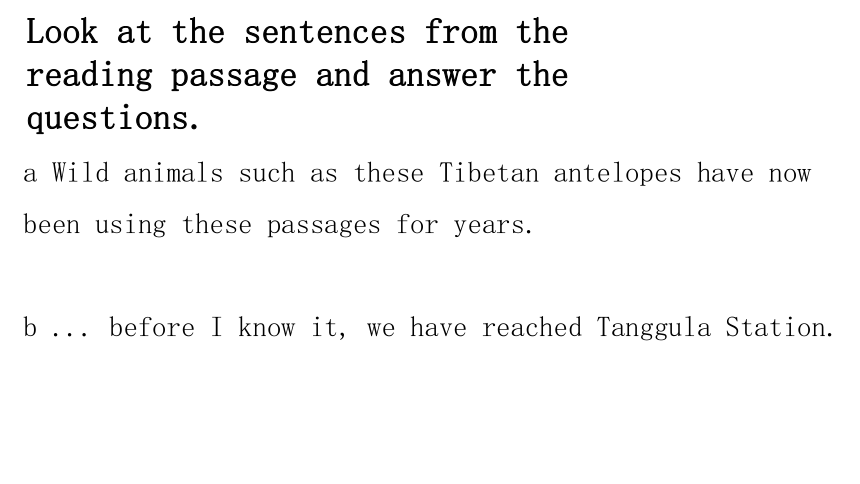
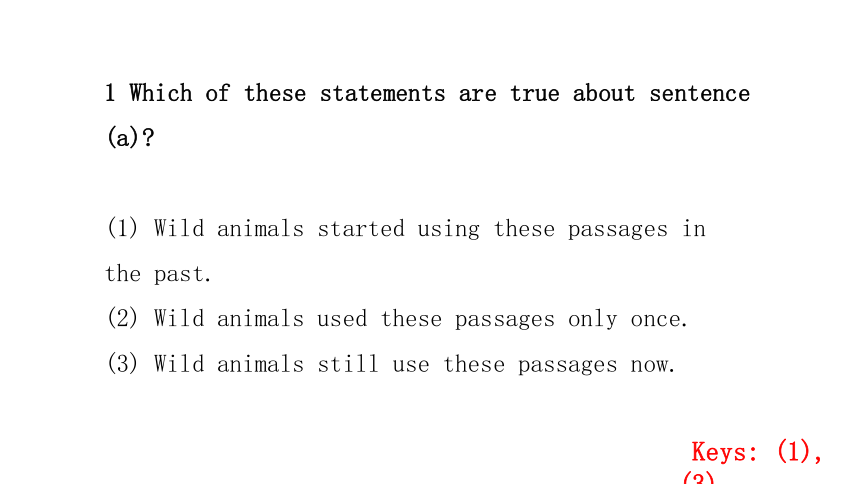
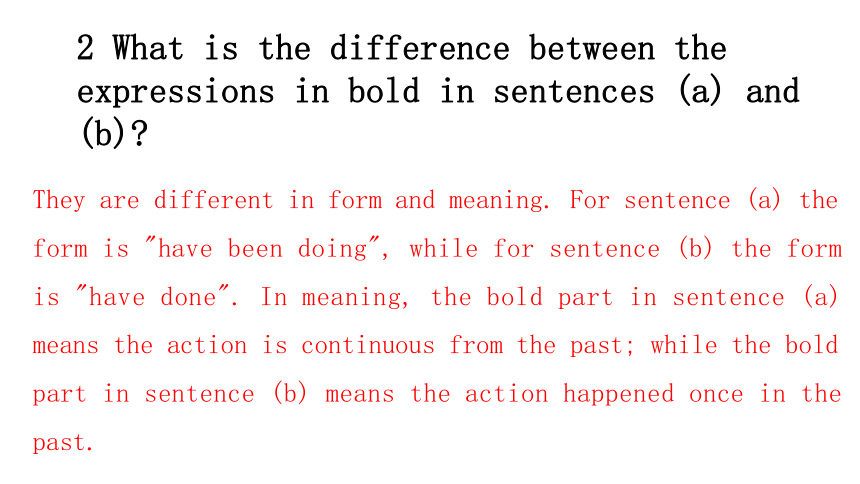
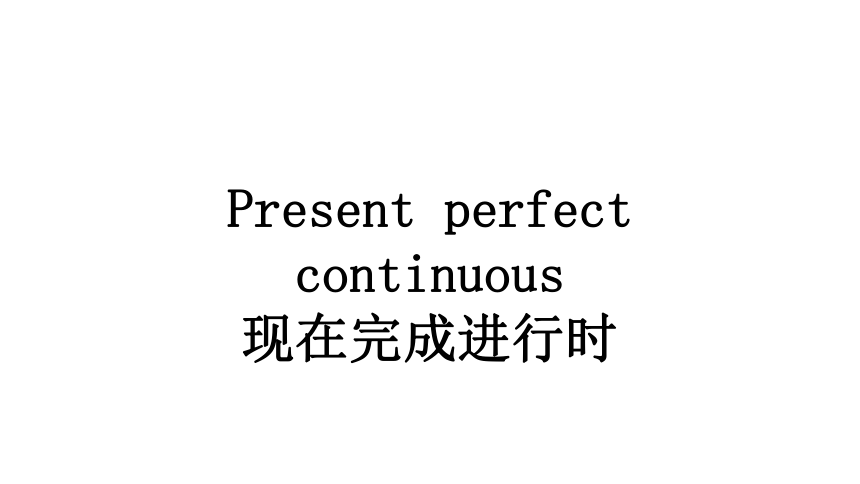
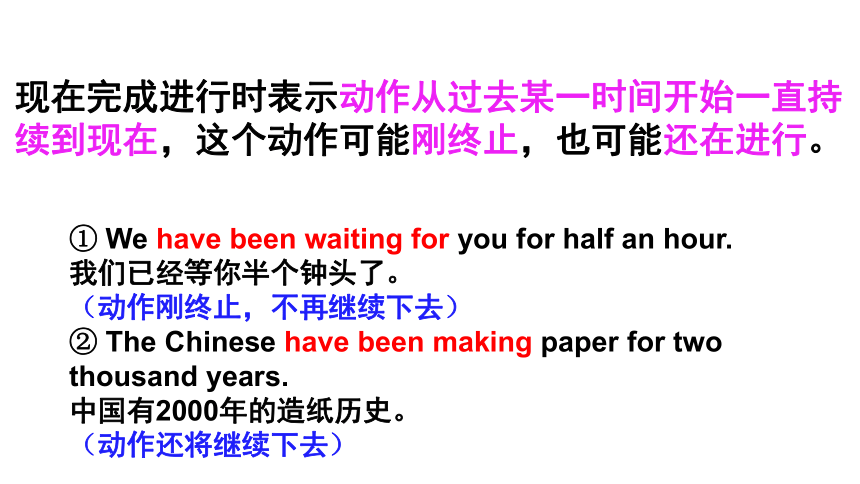
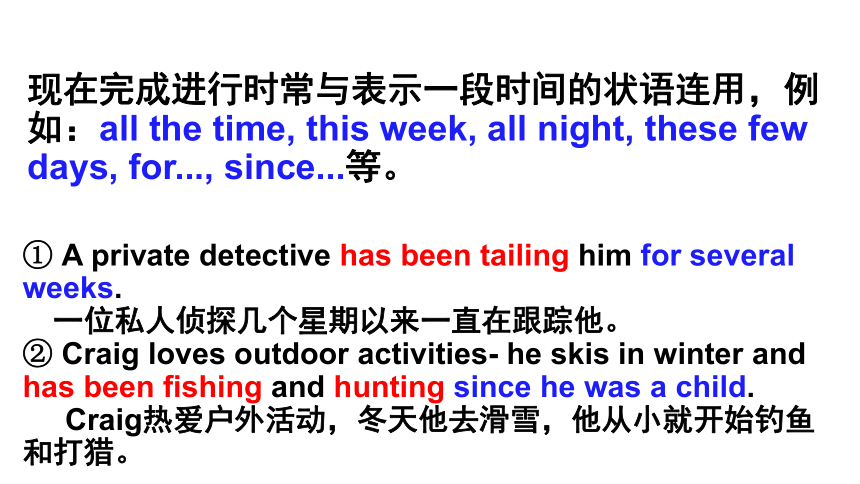
文档简介
(共17张PPT)
Unit 6 Nurturing nature
Using language
Look at the sentences from the reading passage and answer the questions.
a Wild animals such as these Tibetan antelopes have now been using these passages for years.
b ... before I know it, we have reached Tanggula Station.
1 Which of these statements are true about sentence (a)
(1) Wild animals started using these passages in the past.
(2) Wild animals used these passages only once.
(3) Wild animals still use these passages now.
Keys: (1), (3)
2 What is the difference between the expressions in bold in sentences (a) and (b)
They are different in form and meaning. For sentence (a) the form is "have been doing", while for sentence (b) the form is "have done". In meaning, the bold part in sentence (a) means the action is continuous from the past; while the bold part in sentence (b) means the action happened once in the past.
Present perfect continuous
现在完成进行时
现在完成进行时表示动作从过去某一时间开始一直持续到现在,这个动作可能刚终止,也可能还在进行。
① We have been waiting for you for half an hour.
我们已经等你半个钟头了。
(动作刚终止,不再继续下去)
② The Chinese have been making paper for two thousand years.
中国有2000年的造纸历史。
(动作还将继续下去)
现在完成进行时常与表示一段时间的状语连用,例如:all the time, this week, all night, these few days, for..., since...等。
① A private detective has been tailing him for several weeks.
一位私人侦探几个星期以来一直在跟踪他。
② Craig loves outdoor activities- he skis in winter and has been fishing and hunting since he was a child.
Craig热爱户外活动,冬天他去滑雪,他从小就开始钓鱼和打猎。
现在完成时和现在完成进行时的区别
1. 在不同时间状语的情况下,现在完成进行时的动作不一定已经完成,很可能持续下去,而现在完成时一般表示动作已经完成。即现在完成进行时强调动作的延续性,而现在完成时强调动作的结果。
① I've been designing solar racing cars.
我一直在设计太阳能赛车。
② I've designed five or six different cars.
我已经设计五六辆小汽车了。
2. 现在完成进行时往往表示动作在重复,而现在完成时一般不表示动作的重复。
① I've been taking part in races for four years.
我这四年一直在参加比赛。
② How many races have you taken part in
你参加多少场比赛了?
3. 现在完成进行时与所有进行时态一样带有感彩,可使表达显得生动,而现在完成时往往只表明一个事实、一种影响或结果,不带感彩。
① Recently Mary has been doing sports regularly.
最近玛丽一直定期做运动。(有表扬意味)
② Recently Mary has done her sports regularly.
最近玛丽定期做运动。(只说明一个事实)
Complete the passage with the correct form of the verbs in brackets.
have been hearing
has been making
is moving
have been flying
have been given
have been using
Look at the charts and make sentences using the present perfect continuous tense.
The number of trees has been increasing in the last 20 years.
Desert areas have been reducing in the last 20 years.
Butterfly population has been increasing / has becoming larger and larger in the last 20 years.
Listen to the conversation and choose the places mentioned.
Nepal and Thailand are mentioned.
Listen again and complete the notes.
hard work
elephants
hike in the mountains
count
lie on the beach
a nice hotel
a one-day bike tour
Now work in pairs. Discuss what type of travel you prefer.
Complete the boxes with the expressions from the conversation.
Persuading others
Compromising
The fact is that…
Wouldn’t you agree that…
I agree, but…
As a compromise, …
Let’s find a compromise.
Let’s meet in the middle.
Complete the passage with the expressions in the box.
create opportunities for new businesses
help the local economy
not eco-friendly
disturb the wildlife
provide more jobs
use up natural resources
higher carbon emissions
Listen again and complete the notes.
Advantages
Disadvantages
attract more tourists
create opportunities for new businesses
help the local economy
provide more jobs for people living in the area
补充:
raise awareness of local wildlife
provide locals with a chance to experience other cultureshy
not eco-friendly
disturb the wildlife
use up natural resources
higher carbon emissions
补充:
pollute inshore seawater
destroy local ecological environment
...
Unit 6 Nurturing nature
Using language
Look at the sentences from the reading passage and answer the questions.
a Wild animals such as these Tibetan antelopes have now been using these passages for years.
b ... before I know it, we have reached Tanggula Station.
1 Which of these statements are true about sentence (a)
(1) Wild animals started using these passages in the past.
(2) Wild animals used these passages only once.
(3) Wild animals still use these passages now.
Keys: (1), (3)
2 What is the difference between the expressions in bold in sentences (a) and (b)
They are different in form and meaning. For sentence (a) the form is "have been doing", while for sentence (b) the form is "have done". In meaning, the bold part in sentence (a) means the action is continuous from the past; while the bold part in sentence (b) means the action happened once in the past.
Present perfect continuous
现在完成进行时
现在完成进行时表示动作从过去某一时间开始一直持续到现在,这个动作可能刚终止,也可能还在进行。
① We have been waiting for you for half an hour.
我们已经等你半个钟头了。
(动作刚终止,不再继续下去)
② The Chinese have been making paper for two thousand years.
中国有2000年的造纸历史。
(动作还将继续下去)
现在完成进行时常与表示一段时间的状语连用,例如:all the time, this week, all night, these few days, for..., since...等。
① A private detective has been tailing him for several weeks.
一位私人侦探几个星期以来一直在跟踪他。
② Craig loves outdoor activities- he skis in winter and has been fishing and hunting since he was a child.
Craig热爱户外活动,冬天他去滑雪,他从小就开始钓鱼和打猎。
现在完成时和现在完成进行时的区别
1. 在不同时间状语的情况下,现在完成进行时的动作不一定已经完成,很可能持续下去,而现在完成时一般表示动作已经完成。即现在完成进行时强调动作的延续性,而现在完成时强调动作的结果。
① I've been designing solar racing cars.
我一直在设计太阳能赛车。
② I've designed five or six different cars.
我已经设计五六辆小汽车了。
2. 现在完成进行时往往表示动作在重复,而现在完成时一般不表示动作的重复。
① I've been taking part in races for four years.
我这四年一直在参加比赛。
② How many races have you taken part in
你参加多少场比赛了?
3. 现在完成进行时与所有进行时态一样带有感彩,可使表达显得生动,而现在完成时往往只表明一个事实、一种影响或结果,不带感彩。
① Recently Mary has been doing sports regularly.
最近玛丽一直定期做运动。(有表扬意味)
② Recently Mary has done her sports regularly.
最近玛丽定期做运动。(只说明一个事实)
Complete the passage with the correct form of the verbs in brackets.
have been hearing
has been making
is moving
have been flying
have been given
have been using
Look at the charts and make sentences using the present perfect continuous tense.
The number of trees has been increasing in the last 20 years.
Desert areas have been reducing in the last 20 years.
Butterfly population has been increasing / has becoming larger and larger in the last 20 years.
Listen to the conversation and choose the places mentioned.
Nepal and Thailand are mentioned.
Listen again and complete the notes.
hard work
elephants
hike in the mountains
count
lie on the beach
a nice hotel
a one-day bike tour
Now work in pairs. Discuss what type of travel you prefer.
Complete the boxes with the expressions from the conversation.
Persuading others
Compromising
The fact is that…
Wouldn’t you agree that…
I agree, but…
As a compromise, …
Let’s find a compromise.
Let’s meet in the middle.
Complete the passage with the expressions in the box.
create opportunities for new businesses
help the local economy
not eco-friendly
disturb the wildlife
provide more jobs
use up natural resources
higher carbon emissions
Listen again and complete the notes.
Advantages
Disadvantages
attract more tourists
create opportunities for new businesses
help the local economy
provide more jobs for people living in the area
补充:
raise awareness of local wildlife
provide locals with a chance to experience other cultureshy
not eco-friendly
disturb the wildlife
use up natural resources
higher carbon emissions
补充:
pollute inshore seawater
destroy local ecological environment
...
